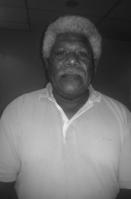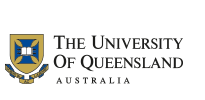Lawrence Titimur

Lawrence Titimur was an industrial advocate and trade union leader. In this interview he discusses the impact of independence on Papua New Guinea, drawing a parallel between the independence of the country and the awakening to the implications of independence on the individual. As General Secretary of the PNG Trades Union Congress from 1986-1992 he discusses some of major industrial disputes after independence, including Ok Tedi.
| Time | Summary | Keywords |
|---|---|---|
| 00:00:00 |
Lawrence Titimur is welcomed to the interview. |
|
| 00:01:06 |
Lawrence Titimur outlines his early schooling on Matupit Island and his father's involvement in politics. He describes how he moved school to Kamarere primary in Rabaul, a multi-racial school. |
education, elections, Epineri Titimur, Kamarere primary school, Matupit Island |
| 00:04:25 |
Lawrence Titimur discusses the influence of a UN visiting mission in the mid-1960s on the independence movement. He outlines his father's involvement with the education of his large clan. |
independence, John Kaputin, United Nations |
| 00:08:20 |
Lawrence Titimur describes how he won a scholarship in Grade 6 for Wolaroi College in Orange, NSW, where he spent four years Grade 7-10, 1969-72. He remembers completing an assignment on the trade union movement in Australia at school. He states that the schooling of so many PNGs in Australia was a scheme that helped contribute talent to the PNG public service. |
Australia, Bob Hawke, education, public sector, union movement |
| 00:12:25 |
Lawrence Titimur remembers that all PNGs studying in Australia were brought together at each holiday to be flown back to PNG creating a strong cohort. He discusses commencing a law degree in PNG in 1973, working with the Development Bank in Rabaul for six months, returning to university in 1975 while working for the Public Service Commission. |
Development Bank, Public Service Commission, Rabaul, rugby union, University of Papua New Guinea |
| 00:15:50 |
Lawrence Titimur discusses working with the personnel of the Public Service Commission and the debates at university around independence. He notes a lack of excitement concerning independence and the departure of many Chinese. |
Chinese, independence, Norman Rolfe, Rabbie Namaliu, University of Papua New Guinea |
| 00:21:58 |
Lawrence Titimur discusses a move by the family from Matupit Island, the ambition of John Kaputin's election to parliament replacing his father and the rise of the Matanguan Association. |
Chinese, John Kaputin, Matanguan, Matupit Island, Rabaul, violence |
| 00:31:18 |
Lawrence Titimur discusses the impact of the Matanguan Association. He describes the changes in PNG after self government. |
Chinese, elections, John Kaputin, Matanguan, Rabaul, self government |
| 00:34:25 |
Lawrence Titimur discusses his work in the Public Service Commission where he joined the industrial relations and employment conditions division. He relates a dispute he was sent to in Maprik involving malaria sprayers who expected additional money once the country was independent. |
East Sepik, industrial dispute, Maprik, Michael Somare, Public Service Commission, Rabbie Namaliu, wages, Wewak |
| 00:44:02 |
Lawrence Titimur discusses the public service local officers pay case in 1964. |
Bob Hawke, L.G. Matthews, Paul Munro, public sector, wages |
| 00:46:07 |
Lawrence Titimur discusses the dispute in Maprik which resulted in the introduction of the hardship allowance for workers. |
Maprik, wages |
| 00:51:37 |
Lawrence Titimur discusses the pay dispute involving British and New Zealand public servants who wanted the same wages as Australians. |
British, Employment of Non Citizens Act, New Zealand, public sector |
| 00:55:04 |
Lawrence Titimur discusses his work with members of the Public Service Board, and the decline in ethics and standards in the public service from the mid-1980s. |
public sector |
| 00:57:36 |
Lawrence Titimur refers to his additional training in Adelaide and discusses the changes that independence brought, including for individuals. |
Adelaide, Australia, independence, legal system |
| 01:03:17 |
Lawrence Titimur refers to the breakdown of PNG's communal systems after independence. |
independence |
| 01:05:02 |
Lawrence Titimur describes how he went to Adelaide for a year and then took up the position of Senior Inspector. He relates how he was sent to the United States to hire air traffic controllers for PNG. He states that on his return the Public Service Commission was being restructured so he moved to the Labour Department as Deputy Chair of the Arbitration Tribunal. |
Adelaide, America, Civil Aviation, Julius Chan, Labour Department, Public Service Commission |
| 01:09:14 |
Lawrence Titimur relates how he was approached by Henry Moses, President of the Bougainville Mining Workers Association, to become General Secretary of the Trades Union Congress. He relates how he accepted and appointed John Paska as his deputy. |
Bougainville, Henry Moses, John Paska, mining, Trades Union Congress, union movement |
| 01:16:55 |
Lawrence Titimur outlines how he worked for TUC for six years with John Paska and a Sri Lankan trade unionist to rejuvenate the TUC. He states that in 1987 he represented the Ok Tedi workers in their dispute regarding housing. |
housing, International Confederation of Free Trade Unions, Ok Tedi, Panguna, Sri Lanka, Trades Union Congress, union movement |
| 01:20:38 |
Lawrence Titimur outlines how he represented 6-7000 workers at Ok Tedi, but was shown no respect by the Australians. |
expatriates, Ok Tedi |
| 01:23:50 |
Lawrence Titimur states that he saw his work with the TUC was part of the ongoing independence movement, of PNGs standing up for their rights. |
BHP, expatriates, independence, Ok Tedi, Trades Union Congress |
| 01:26:25 |
Lawrence Titimur discusses that independence didn't change the status of PNGs at work. |
housing, John Momis, Ok Tedi |
| 01:28:12 |
Lawrence Titimur outlines the home ownership scheme for Air Niugini. He discusses his ongoing involvement in other trade union organisations. |
Air Niugini, housing, Martin Ferguson, Simon Crean, South Pacific, union movement |
| 01:32:48 |
Lawrence Titimur discusses the changes after the death of Henry Moses leading to the conflict on Bougainville. |
Bougainville, Henry Moses |
| 01:36:07 |
Lawrence Titimur talks about his close relationship with Henry Moses, and his refusal to go to Bougainville during the crisis. |
Bougainville, Henry Moses, independence, John Paska |
| 01:39:24 |
Lawrence Titimur is thanked for his contribution to the interview |
|
| 01:39:54 |
Interview ends |
Biography

Lawrence Titimur
Lawrence Titimur is a lawyer who worked as an industrial advocate and trade union leader. He was born in 1955 and attended primary school on Matupit Island, Rabaul. His father, Epineri Titimur, represented East New Britain in the House of Assembly from 1968-1972 and introduced political discussion of independence into the family home. Lawrence moved to the Kamarere Primary School, Rabaul, and in 1969-1972 attended Wolaroi College in Orange, NSW. On his return to PNG he began a law degree at UPNG in 1973 which he combined with working for the Public Service Commission. He joined the industrial relations and employment conditions division and in 1976 was sent to deal with a strike of workers at Maprik, East Sepik, Prime Minister Michael Somare’s seat. Following a year of training in Adelaide he was appointed Senior Inspector with Public Service Commission. He followed that by a position as Deputy Chair of the Arbitration Tribunal for six years.
Approached by Henry Moses, he became General Secretary of the PNG Trades Union Congress (TUC) in 1986 and represented workers in the Ok Tedi mine conflict of 1987. He later became involved in trade union congresses in the South Pacific, Asia and internationally.
Copyright © Papua New Guinea National Museum & Art Gallery, 2025
The copyright holder of this material grants users permission to access the material on this website for the following purposes only: research and study, education, other non-commercial and non-public uses.




